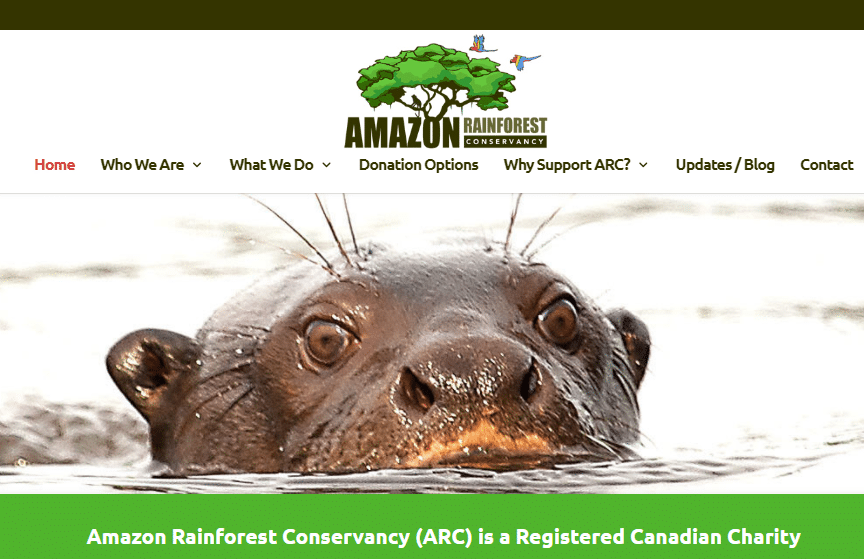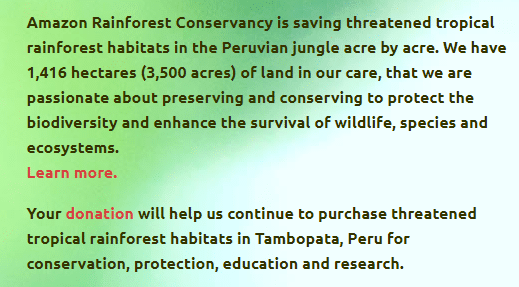ARC is a Canadian charity, therefore dollar figure above is in Canadian dollars. However, the $5 donation made with each shirt purchased is USD, we simply convert $5 USD to CAD before making the donation. I.e. every shirt generates a $5 USD donation that converts to ~$6.50 CAD depending on the exchange rate that particular day.
If you are here, reading my blog you are already supporting rainforest conservation!
Like most blogger’s, I have monetized my website through the Amazon Affiliate program and Google Ads. But this is where I differ:
I take a percent of the cash flow I receive and donate it to the Amazon Rainforest Conservancy. This is an incredible Canadian charity who uses donations to buy and protect endangered areas of the Peruvian tropical Rainforest. Check them out!
Here are 3 ways you can support Rainforest Conversation and my blog:
1) Just by viewing the Google Ads I will receive a small commission from Google (this includes ads on my YouTube videos), so be sure to turn off your AD-Blocker!! 🙂
2) If you make a purchase from Amazon after clicking on one of my Amazon links, Amazon pays me a small commission (5-7%) for sending you to their website. Therefore, If you want to support my blog and rainforest conversation just make any Amazon purchase you like by clicking on one of my links first. Just think, you can buy needed supplies for your animal at home while simultaneously help save their cousins in the wild!
3) I also sell Animals at Home branded T-Shirts! $5.00 from every shirt is donated directly to ARC!
To be totally transparent and to recap: A percentage of the cash flow I receive through the blog goes to the expenses associated with running a website (video production, hosting fees, etc.), and also a small profit for myself. And a percentage is donated to the ARC.
Let’s help save the rainforest together! Read my full article below!
Is it contradictory to support both the pet trade and rainforest conservation?
No it is not! I would like to explain from my point of view where wildlife foundations and the pet trade intersect. The pet trade will always exist. Thankfully, the lion’s share of the exotic pet trade in North American is supported through captive raised and bred animals.
Of course, I realize that at one point in the past the ancestors of the animals in the pet trade were pulled form their native environment to initially support the trade. I cannot argue in support of that, although now that it has occurred I am able to see some benefits from it.
I, like many others are completely fascinated by animals, especially reptiles. Years ago, I decided that I would like to keep my own. By keeping my own animals, I have become even more fascinated with them and therefore I am much more sympathetic to the current situation of their native counterparts.
As far as I can tell, the pet trade is not going away. The animals within the pet trade are very much a distinct population from their distant, wild relatives. Part of the reason I started my blog was to promote the natural care of the captive animals, I figure it is the least we owe them.
The pet populations (in North America) are not threatening the native populations. I argue that they are beneficial to them.
The pet trade does the following:
- Sparks interest and allows for interaction with exotic animals
- Requires animal owners to learn about natural habitats
My goal with the Animals at Home blog is:
- Convert the enthusiasm pet owners have for their animals into monetary donations directed towards their animal’s natural habitats.
Wild animals should be left in the wild!
I can agree with the presupposition many people have, which is: wild animals should be left in the wild. However, what if we use the population that is already here to stay to educate people on the crisis in the rainforests?
If you are here, reading my blog you are already helping save the rainforest! Read the top of the page to learn how!
People who own snakes, love snakes. It is my opinion and hopefully yours as well that pet lovers are eager to help native counterparts.
The pet trade in North America (for the most part) does not support wild caught animals. Thankfully CITIES and other animal import laws ensure that wild imports are falling into the right professional hands. We, as pet owners, do not view the rainforest as a picking grounds for new pets.
It’s the contrary to that. Many of us feel that preserving the animals in captivity (with clean bloodlines) will go a long away to preserving the animals on the planet. A satellite “Noah’s Ark”.
Without the pet trade, I certainly would not know the unbelievable, explosive colour of a Brazilian Rainbow Boa or the pure muscular strength of a Boa Imperator and I can guarantee I would not be interested in donating to a charity if it weren’t for them.


